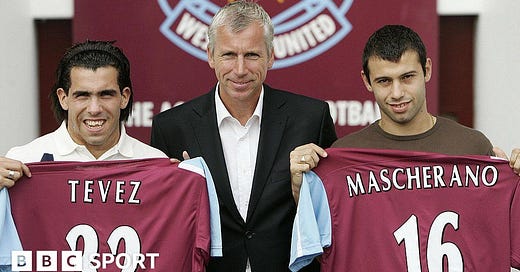The Rise and Fall of Player Ownership in Football: A Forgotten Moment in Time
How third-party ownership shook the football world, made millions for investors, and led to a global ban that changed the game forever.
During the mid-2000s, football was undergoing a financial transformation driven by a surge in TV money, foreign investments, and increasingly lucrative player transfers. Amidst all this, one crucial practice that has since been largely forgotten is player ownership, particularly third-party ownership (TPO). Although now banned, TPO played a significant role in shaping football's financial landscape and created a period of controversy that would forever change how clubs approached transfers.
What Was Third-Party Ownership?
Third-party ownership allowed external investors or companies to own a portion of a player's economic rights. In these deals, a football club would not fully own a player but rather share ownership with outside investors, who hoped to profit when the player was transferred to another club for a higher fee.
This system thrived in countries where cash-strapped clubs sought creative ways to bring in top talent without shouldering the full financial burden. South American leagues were particularly fertile ground for TPO deals, with investors stepping in to fund the development and eventual transfers of promising young players to European clubs.
How It Came About: The Role of Agents and Clubs
While third-party ownership had existed in some parts of the world for years, it came to widespread attention in European football following the controversial transfers of Carlos Tevez and Javier Mascherano to West Ham United in 2006. Their move was facilitated by Kia Joorabchian, a businessman representing Media Sports Investment (MSI), the company that held the economic rights to both players.
West Ham signed both players for a nominal fee, but the club did not fully own their rights. MSI retained the economic stakes, positioning itself to profit from any future transfer involving the two Argentine stars. This arrangement was largely hidden from public view until the duo’s influence became undeniable—particularly when Tevez played a crucial role in helping West Ham avoid relegation in 2007.
The controversy around the Tevez-Mascherano deal exposed the murky nature of TPO agreements, raising ethical questions about who truly had control over a player's career. This was not just a West Ham problem—third-party ownership was a growing trend across Europe as financially stretched clubs tried to stay competitive without overextending themselves.
The Money Involved: High-Stakes Profits
The financial stakes of third-party ownership were massive. Investors were drawn to the potential to make large returns on relatively small investments. By purchasing the economic rights to a young player, they could profit immensely if that player was transferred to a bigger club for a significant fee. In many cases, investors would purchase these rights for a fraction of what they would ultimately be worth.
Keep reading with a 7-day free trial
Subscribe to Original Football to keep reading this post and get 7 days of free access to the full post archives.




